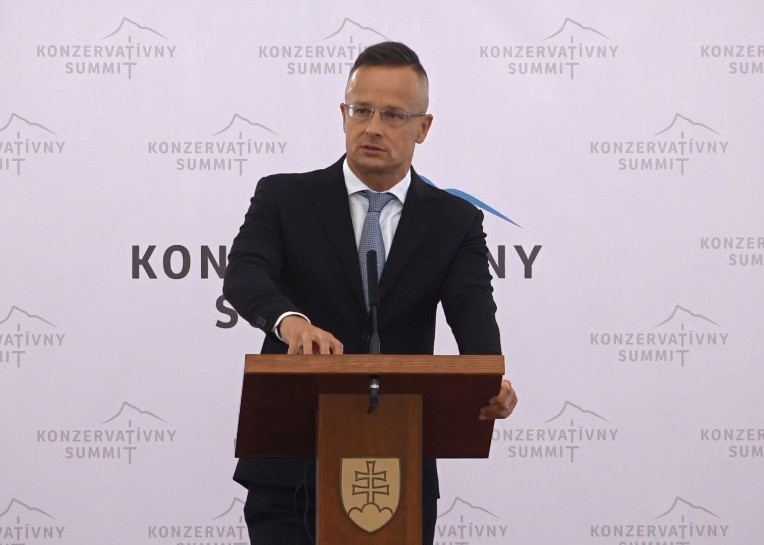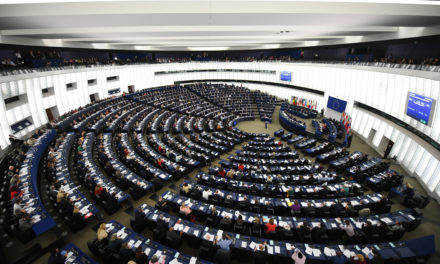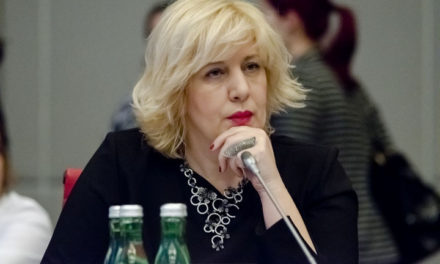The liberal mainstream, which is one of the most exclusionary ideological trends, is building a dictatorship of opinion, stated Péter Szijjártó, Minister of Foreign Affairs and Trade in Bratislava, where he gave a presentation at the Conservative Conference organized by the Ladislav Hanus Society on Monday.
In his presentation, the head of Hungarian diplomacy pointed out: it is a reality supported by facts that the European Union (EU) is weakening, the population of many Western European countries is extremely pessimistic about the future, and all this is due to the liberal mainstream.
"The international liberal mainstream is a hypocrite, because they teach us how to create a democracy, how important freedom of opinion is, and meanwhile the liberal mainstream is the most exclusionary ideological trend, with which if someone disagrees, they are immediately stigmatized and excluded, so the liberal mainstream, as a hegemony of opinion, builds a dictatorship of opinion"
- said Péter Szijjártó.
In his speech, the Minister of Foreign Affairs pointed out that the weakening of the EU is shown by the fact that its share in the world's GDP has decreased from 21 percent to 18 percent in the last 20 years, and its competitiveness has also decreased, since ten years ago 14 of the world's 50 largest companies were European, but today only 7, and meanwhile 22 percent of the world's social expenditures are paid in Europe, which calls into question the sustainability of the system. He added: the population of many Western European countries is pessimistic about the rise in living standards: 57 percent of the French, 53 percent of the Belgians, as well as half of the Austrians and Spaniards, while the level of pessimism in Central Europe is well below the European average of 40 percent. .
Péter Szijjártó said: it is against the will of the Central Europeans that the EU is weakening. He emphasized that the Central Europeans, conservatives and Christians, want to participate in the debate about the future of the European continent, but the liberals want to prevent this, which is anti-democratic. He also emphasized that: in the past, strong nations and Christian values made Europe successful, and the European Union could be strengthened by a conservative turn, if the liberal mainstream was replaced by a patriotic policy based on democratic, Christian values, adhering to the original European values.
In connection with the practical implementation of this idea, the Minister of Foreign Affairs mentioned the conservative family, economic and security policy, as well as the protection of Christian communities. Taking Hungary as an example, Péter Szijjártó pointed out in connection with economic policy: Hungary is building a work-based society, and while 11 years ago there were 1.7 million taxpayers in Hungary, now there are more than 4.2 million taxpayers, the tax rate is at such a level that it is worth working.
Péter Szijjártó said about the security policy: the protection of the state's own borders is of fundamental importance, which is also proven by the failure of the Western European integration policy.
Speaking about family policy, the minister stated: the family is under the greatest attack, even though our future and the future of Europe also depend on the family. He said: Hungary has a major national goal for this year, namely that if economic growth reaches 5.5 percent, all families with children will be refunded the personal income tax they paid this year.
Regarding the protection of Christian communities, Péter Szijjártó mentioned: Hungary has created a program to help the most persecuted communities, which helps these communities locally, in their homeland.
At the all-day event held in the historic building of the old Bratislava parliament, Boris Kollár, the speaker of the Bratislava parliament, also spoke, and in his speech he pointed out the rejection of illegal migration and the importance of a family-oriented policy. He emphasized that illegal migration is an illegal act that cannot provide a basis for legal settlement, and in this context aid must be separated from irresponsibility, because otherwise it may happen that one day the people here will have to flee their own country.
Kollár stood up for putting family-centered policy at the center and pointed out: In Slovakia, the steps taken by the Hungarian government in this area are being closely followed, which he characterized as inspirational and a guide.
According to the vision of the organizers of the conference, which was held for the first time this year, with the aim of creating tradition, the event can provide a platform for the conservative thinkers and politicians of the region to exchange opinions and help to reconcile the sometimes different, but basically common views.
MTI












